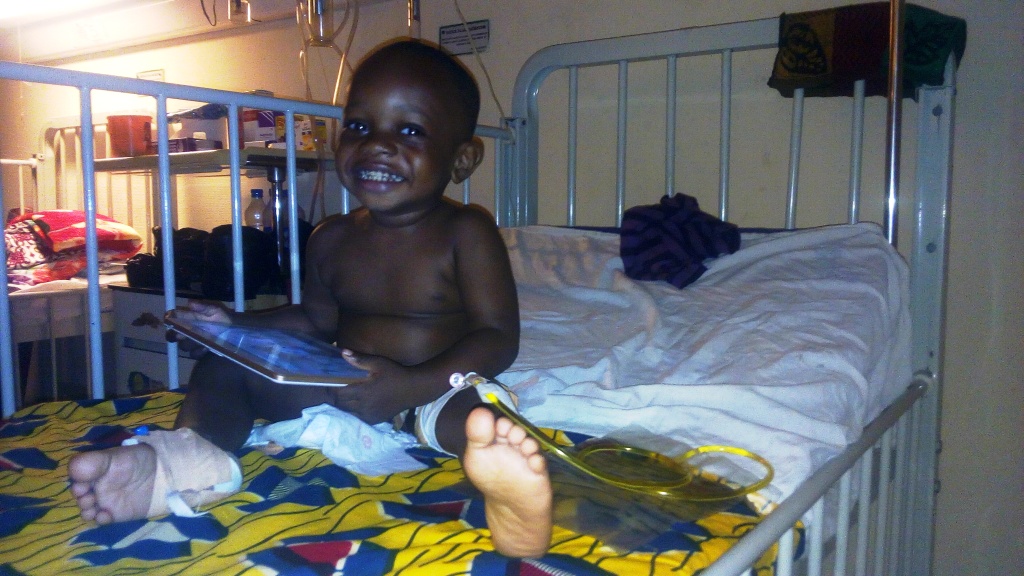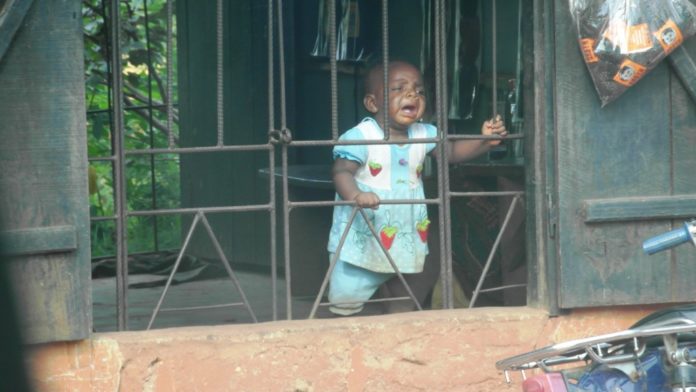Striking workers, negligent staff, a dash of tears and pain. A 20-month-old baby spends three weeks for a hospital surgery to experience what Nigeria’s health system has to offer children
by Judd-Leonard Okafor, Daily Trust
My name is Dev, and by the time you’re done reading this in the next hour, 96 children would be dead. I may be. I may not be.
Up to 2,300 of us under age five die each day. Statistically, two died while you took a minute to read those words.
For those of us who die in their first day, first month or first year, it’s more. I scaled that hurdle. I turned 20 months last November, but already feel 200 years old.
I feel old because of what my eyes have seen, and ears heard, of the health system in my country.
It began when I was two days old. It actually began way longer than that. I remember how Mummy rushed frantically to ready for her antenatal appointments. The rush started at 4.30am on the day because she had to be at the hospital by 6. When she’d first gone to register, a nurse had told her, “If you come here at 6.30 or 7, you are 100% late.”
The reason was the hospital had to deal with so many women, they put out daily quotas. A woman on entry picked from among numbered cards. Once the cards were exhausted, the day’s quota was filled. Any other woman coming after those cards were gone was on her own.
Mummy had health cover as a beneficiary of Daddy’s work health insurance, but that only meant she paid 10% of cost at anytime—for only a handful of conditions and tests covered by the premium.
Having a health insurance didn’t matter. It was just the way things were.
Mummy hated those appointments but had to put up with them for my sake. Daddy insisted, and would take her there himself. He even followed her into the labour room when I was born, and captured the entire process on video.

Hypo-what?
The trouble started two days later. Everyone fussing over the newborn took time to notice something wrong down there.
They called the nurses, who called the doctors. After they screamed at each other, the doctor gave his verdict: hypospadias.
He said it wasn’t serious but advised I shouldn’t be circumcised just yet until a repair could be done. But that was to be done when I had grown some. By the way, they couldn’t do it—a secondary hospital run by the Nigerian Customs Service. I needed a urologist; they didn’t have one.
My health journalist Daddy began researching the condition. The bottomline: my urine didn’t come in a stream; it showered, because my urethra formed just before the tip of my peepee. He wasn’t having any of it.
He researched the experts—and one urologist came recommended. He bid his time while I added months last August. He called for an appointment. The only available opening was four months away in December 2016 at National Hospital, Abuja—a foremost tertiary centre that’s meant to be “the hospital” for Nigeria.
A consultation was booked, fees paid and meeting held. I was older and big enough, they decided, and fixed a surgery for May 2017, by which time I should be 15 months old.
Daddy had private insurance but when a medical condition is not covered or means you are referred to a hospital different from that on file, you are on your own.
He was looking at possible medical bill reaching N500,000 and began saving. Two months before my May surgery, Granddad up and died in March 2017, and his funeral, Igbo style, cleaned out the savings.
Strikes, and spending through the nose
Daddy called the hospital to postpone the surgery till August. By the new date, nurses went on strike. Another postponement followed. By the second date, it was the turn of resident doctors.
Good thing it wasn’t an emergency, or I’d be at the mercy of Nigeria’s health system.
Finally by October end, the full complement of surgical team, pre- and post-op, was ready.
Two days before October 30, I was admitted to be prepped for surgery. The full blood workup was ready. The consultant, the residents and house officers would look me over and prep me. They would run a line into my vein through which they would administer medication and intravenous fluid when needed.
The payments started, all in triple-zeros. Theatre deposit, drugs, accommodation in a six-bed room, nursing care, medical care, consumables.
It was of no use because Daddy, despite an upfront deposit, bought the consumables himself: paracetamol vials and syrup, plaster, surgical gloves, cannulas, syringes, Betadine, lubricating jelly for the suppositories. All the consumables for which he’d deposited upfront.
These days, when someone talks about out-of-pocket spending, health insurance or medical incompetence, I know just what they mean.
Despite the down payment, Daddy spent most of the days between the hospital and a pharmacy outside the hospital grounds, clutching always an outpatient prescription form.
Which was weird: there I was on admission but still being given prescriptions as an outpatient. Turns out most medication I needed weren’t even on supply for an inpatient.
I spent the night before the surgery crying my head off, as house officers and residents poked and prodded my hands and legs to get a line in. Daddy and Mummy held me down for them. Tears streaming down my face, I looked at Daddy, then Mummy, then back again and wailed, “Daddy, I deaddddd.”
He almost “deaddddd” too. I could see it in his eyes. But he wouldn’t stop them.
Last-minute shocks
The morning of the surgery, I was woken up early and stripped naked, then thrust into a hospital-issue wrap and surgical cap. A nurse penned my name on a band and snapped it around my wrist.
A nurse led the way. Mummy hung in the rear, terrified of her own steps as she followed. Daddy carried me, marched to the theatre, then sat me in a bed.
He was used to hospitals, theatres in particular. He’d witnessed open-heart surgeries, stood through kidney transplants, live-blogged spine surgeries. He wasn’t fazed. He began singing “Let it go” from Disney’s Frozen. It was my favourite.
It was a Monday morning, and the theatre staff were in prayers. Once done, they began picking their patients. My urology team wasn’t there yet, and Mummy panicked and insisted she would pull the plug on the surgery if the consultant on the team didn’t show up. She had so much faith in him.
That’s when they discovered there were no suppository painkillers for me. I’m not kidding. I was at the theatre door, and they just discovered no one had told Daddy to buy the painkillers, which he would have done the previous day. He had two whole days to buy all needed supplies.
He shouted at one or two people. He pulled his tablet and put “Let it go” on loop, then handed the tablet and me to Mummy, who was too anxious for any singing. He dashed out to the pharmacy.
When he returned, the urology team was assembling. Then another discovery: ceftriaxone—the almighty antibiotic needed for the surgery—wasn’t available. Daddy compromised: he borrowed one from a 40-something man scheduled for surgery after me, handed the vial to the team, then dashed out to get a replacement.
I would eventually take a vial a day for five days after surgery. That’s how important it was. And Daddy’s eye popped in his head at the pharmacy bill.
You’re dead, if you know nobody
It wasn’t all gloom and doom. I know the compassion and care, attention and proper bedside manner that some health workers have. The surgery went well.
Even with a catheter peeping out from a pack of bandage between my legs, I became a favourite of the nurses and residents and house officers on ward rounds. My drugs—bought, of course, from an outside pharmacy—were prompt.
Then the rounds stopped. For four whole days, no one checked on me. The line which delivered the antibiotics slipped; the nurses said it wasn’t their job to put in lines.
Mummy complained I was bleeding into my catheter; the house officers replied, “talk to my superiors”. No one came to change my bandages, look at my catheter. She was so angry, she nearly fought everyone.
Daddy began calling on phone to complain to higher-up consultants, who in turn got angry and complained he was taking advantage of my knowing them to ask when I could be discharged.
With the goings-on, Daddy stopped talking about discharge and focussed on the bleeding instead. The realisation was simple: if you didn’t know someone, you got shabby treatment.
Aunts and uncles called Mummy, and she told them Daddy had gone berserk and was threatening to take the matter further.
Mummy said she didn’t want the attention.
Aunt said, “But something needs to be done. You don’t have to know someone to be taken treated well. Does that mean, if you don’t know someone, you’d be left to die?”
An Igbo saying says he who knows someone is better off than he who has money. Otherwise, I may never even have been lined up for the surgery in the first place.
Mummy prayed, watched me, fed and watered me. My urine capacity rose with my fluid intake.
Hope going, going, gone
She took solace in mothers and kid patients on the ward. One two-year-old girl who had a length of her intestines taken out in the wake of some complicated typhoid that chewed up her guts. Another 12-year-old had similar condition, and both were on my side of the ward.
On the other side, a three-year-old with two catheters into him to help him drain urine; and another two-year-old with a tumour eating up his entire backside in his third month in hospital.
The two girls with perforated intestines, and then the boy with two catheters, got released from hospital. Mummy was encouraged.
Three other children took their place. No case is worse than another. We were all children fighting to survive, battling to stay alive.
Mummy had had the battle up to her un-pencilled eyebrows. When the doctors came and undid my catheter on a Monday morning, she didn’t react as a top resident questioned why the records showed no junior doctor checked on him throughout the weekend before.
They said I’d be kept for observation for a day or two more. And when the consultant asked if she was ready to go home, it sounded a funny-weird question.
For over two weeks, she slept in a chair, her head hunched over the side of my tiny paediatric cot. Sometimes, she was bent over the cot while nursing me while sleep claimed her. For two weeks, the space around my cot was her whole world. What a question! She said, “Yes.”
The discharge papers were drawn up, she booked a check-up appointment for a month later while Daddy processed the bills.
I was ready to go but after two weeks sprawled in a bed, my leg muscles were weak. I would learn again to walk, but I was relieved to leave that place.
The sight of people in white, stethoscopes, syringes, white-gloved hands coming near me made me crawl out of my skin.
But not all my roommates would leave with me—not that day or any other. Shortly after I left hospital, the boy with a tumour was readying for some procedure that would cost his poor mother N80,000 every two weeks. The new boy with complicated typhoid on my side of the room was discharged, but detained in hospital because his family couldn’t pay the bills. Then he got sick again and was made to stay on.
Days later, I found Mummy crying. Both boys had died.



























